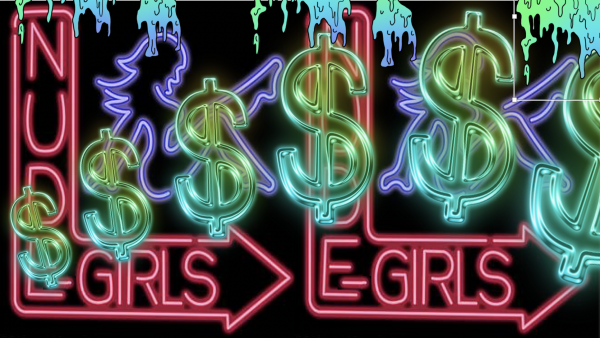Aristotle points the way to true virtue through free will.
Libertarians Are Coming for Your Sexual Dignity

Perversion can never be stripped of shame.
Reason dot com bloggers and libertarians of every stripe (left and right) are freaking out. Why? Because “Conservatives are coming for your Pornhub.” And they are right to be afraid.
In early December, four U.S. Representatives sent a letter to Attorney General William Barr, asking him to enforce existing anti-obscenity laws and shut down the porn industry (yes, America has anti-porn legislation on the books; yes, there have been zero prosecutions since the Obama administration). In the letter, the Representatives note that “15 state legislatures have declared that pornography is causing a public health crisis.”
The language of porn as “public health crisis” or even “epidemic” is the standard line among conservatives. Josh Hammer’s article in First Things, which takes libertarians to task for their opposition to the enforcement of anti-porn law, uses it. So does Pascal-Emmanuel Gobry’s doorstopper piece in American Greatness. In short, porn harms the people who create it, the people who watch it, and the people who try to date and marry porn addicts.
But the “public health crisis” line is actually a dead end. We are not dealing here with children inhaling toxins from an oil refinery. We are dealing with men enslaving themselves to the pleasure they get from watching an infinite supply of other people have sex. It is neither useful nor honest to talk about pornography as a “public health” problem. People know their porn habit isn’t just bad for them—it’s wrong. When so many of us derive our greatest physical satisfaction from something we know is debasing us, more than our health is at stake. Our humanity is.
Our infinitude of porn must be seen as the whole that it is, irredeemably vile in what it is doing to us. Even before the explosion of online pornography, obscenity was firmly illegal. Yet now we are told it is sacrosanct. A polity worth living in is a polity that keeps pornography away from our children and protects adults from its predatory producers and consumers.
We’re Not Doing This for Our Health
Gobry’s essay, “A Science-Based Case for Ending the Porn Epidemic,” while rife with helpful data, skirts this point. His big comparison is the gradual emergence of a public health consensus around smoking and the nascent public health research around porn. Policy will follow science, eventually. But does this comparison even make sense?
“I’ve been a smoker since my early 20s,” Gobry writes. But he admits it—he knows all the public health data and yet he still smokes.
So it is with porn. Despite rock-solid, irrefutable scientific evidence and complete unanimity that smoking poses dire health risks, millions of people still smoke and we have yet to ban it outright. So why take this as the model for banning porn?
Here is the biggest problem with the whole “public health crisis” language. Imagine for me that sexologists (is that a real thing? sounds perverted ) could prove that watching porn for 15 minutes a day lowered your blood pressure, prevented heart disease, and diminished your chance of stroke. Would you then endorse porn every day for everyone? Of course not. Even if it improved our physical condition, it would still debase our humanity.
That’s why more and more Americans, including young people, are rediscovering the conclusion that we can tell porn is wrong because we can tell it is porn. There is nothing good about it. Damn the public health effects. Pornography is wicked. This isn’t a handwashing campaign. This is a moral crusade.
And the inherent end this crusade must seek is a ban on pornography.
Shame, Shame, Shame
Banning porn will require a pervasive sexual re-norming. This is a democracy, and we’re going to have to figure out how to get people on board with it. Even if we did convince people of the public health case, where would that leave us? With erectile dysfunction-type warnings in the first five seconds of every porno? We need something better than that.
For a path forward, look to an unlikely model: the gay rights movement. In 2008, my home state of California voted in favor of a statewide constitutional amendment to enshrine marriage as exclusively between a man and a woman. Yes, that was California. Remember? In less than ten years, the Supreme Court declared the amendment illegal—in large part because such legislation had become unthinkable for many Americans (including the ones who themselves had voted for it just eight years previous).
So how did they do it?
Gay rights activists repeatedly and publicly shamed us, saying that if you oppose gay marriage, you hate gay people. That line, repeated and modified and transposed in a million different ways, sexually re-normed America in the space of a decade.
Now, it’s our turn for a sexual re-norming of America. Conservatives can turn Americans against porn. How?
You might expect, at this point, for me to go all Andrea Dworkin, anti-porn radical feminist and say that porn supporters—people like Matt Welch who complains that we’re coming for his Pornhub and C.J. Pearson who says that if you don’t like porn, don’t watch it, and the entire Libertarian Party—all hate women. Well, they like porn, so that’s probably true.
But the trouble, really, is that trying to shame people who actually do hate women by calling them misogynists won’t work. They like hating women. This is part of what makes porn so addicting. (Sidenote: The “you hate gays” line worked because people generally did not hate gays, and did not want to hate gays. They just weren’t woke enough to realize that not-hating-gays required being-for-gay-marriage. They were quick to comply once shamed.)
I still believe the shaming route can work, but we have to try something a little bit different. Let’s try calling porn supporters despicable perverts instead. After all, it is true.
For one, virtually everyone is ashamed of using porn. The only people who are not, and who whip it out on the bus or at school, end up in jail or on a sex offender registry. Our own shame about porn—the fact that we do it with the door closed, the windows shuttered, and that we delete our browser history afterwards—tells us everything we need to know. Rather than trying for another half-century to “destigmatize” perversion, how about we actually listen to our shame and let it teach us something for once?
If we could bottle up all the shame and grief men have expressed in their evangelical men’s groups and their Catholic confessionals about their own unremitting battles against pornography, and we could somehow direct it at the legions of despicable perverts who support pornography, I am convinced we could pass a constitutional amendment and build the Great Firewall against pornography before Trump’s second term starts.
Porn in the digital age is unlike porn in any other. The untrammelled ease of access and the algorithmic recommendations that reward addiction put consumers on a highway to watch not only more violent and more degrading sex acts, but to descend ever deeper down whatever rabbit hole of porn enslaves them most. What was titillating yesterday is vanilla today; what was “just a preference” or “kink” today becomes a consuming perversion tomorrow. Like a user chasing a high, the porn viewer is always chasing the next feeling of transgressive shock or psychological surrender. While I give him a hard time, Gobry-the-Smoker’s article is incredibly helpful in illustrating the neurological and technological aspects of this phenomenon. His analysis of the rise of Kink dot com and the ever-escalating brutality of the sex acts that that site produces and records makes for horrifying reading.
Pornography, like prostitution, makes a mockery of sex. Sex is the physical expression of a man and woman’s loving union and a sign of the cosmic potentiality of love, which is ordered to the creation of new life. Porn turns sex into sterile, self-serving, and exploitative pleasure. The only “union” present is the cash nexus—the participants are “uniting” because they’re getting paid.
You don’t want your kids watching porn, you don’t want your spouse watching porn, you don’t want your daughter to grow up to be a porn star. And when you watch porn you hate yourself for it. So why should anyone be watching porn or “starring” in it?
The porn-as-public-health-crisis argument is ultimately a consequentialist one: The consequences of watching porn are bad, so we should ban it. By leaving the argument off at this consequentialist juncture, we accept the libertarians’ first principles and betray the Founding.
After all, J.S. Mill didn’t write the Constitution. We the People did not enshrine the harm principle into law. “You do you and imma do me” isn’t in our founding documents.
But here is what is so incredibly infuriating: Conservatives act like it is. And when we make the “public health crisis” argument, we are just diddling around in the libertarian perverts’ consequentialist arena. Which is what the 2016 GOP platform did. The platform was sorta encouraging because at least it named pornography a “menace,” but it was ultimately discouraging because it boiled the problem down to, guess what? “A public health crisis.”
Luckily, the Right is in the middle of a “re-founding” moment, a reexamination of our core principles and sources profound enough, if carried through, to mark a totally new beginning. At the end of all of it, we might finally get to escape from Consequentialism Land forever. Opposing porn on a morally reasoned basis is how to do this.
Ahmari-French, populists vs. elitists, nationalism vs. fusionism—these are attempts to describe the nature of our movement’s fitful re-founding. What it ends up getting called does not matter (The People v. The Perverts?); what matters is whether the Right’s re-founding leads to an American re-founding. Because if we do not re-found America, we are toast.
Don’t believe me? Ask Clarence Thomas.
Religion or Bust
At the October dedication of Hillsdale College’s new Christ Chapel, Justice Thomas quoted this famous line from John Adams’s 1798 letter to the Massachusetts Militia: “Our Constitution was made only for a moral and religious People. It is wholly inadequate to the government of any other.”
Upon reading this line, you nod your head approvingly. But do you really believe it? Have you actually thought about what Adams’s words imply, for us, right now?
If he is right, America is on the brink of total collapse. Actual religion in this country is, with startling speed, being replaced by atheism, vapid “spiritualities” (New Age and otherwise), and Moralistic Therapeutic Deism of the most gauzy varieties. Of course, this is not news. But if it means the death of “a moral and religious People,” which it does, then it means the death of republican government in the United States.
For all their genius, the Founders did not tie down the patio furniture tightly enough. Now that the typhoon of Liberalism is blowing through, the moral and religious characteristics that made republican government possible in America are being blown overboard.
Patio furniture on the ship of state—mere accessories. That is how libertarians and leftists view American religiosity and morality. In reality though (to switch metaphors wantonly) religiosity and morality are no mere accessories. They are the ballast that keeps the ship of state afloat. They have been punctured, and without a titanic effort of repair, the ship is going down.
What must the American re-founding look like? It cannot just be a shift in mentality—though that is a prerequisite. One essential re-founding task that lies before us—the chief re-founding task without which all else fails—is erasing naïve viewpoint neutrality from our laws in favor of robust state protection for monotheism and natural law. It will not be good for the prose quality of our founding documents, but unfortunately we have no choice but to pass a constitutional amendment that says, “‘you do you and imma do me’ is not part of this Constitution of the United States.”
But we have to build up to this constitutional amendment first—we can’t pull it off straight out of the gate. So first off, advocate for, pass, and enforce laws that presuppose that protecting good religion and natural law is worth doing—laws which explicitly reject perverted utilitarian and consequentialist reasoning.
And that is what the porn debate gives us an opening to do. Stop talking about public health consequences and start telling it like is: Porn is despicable; its supporters are perverts. So long as we tacitly assume that the harm principle marks the bright line beyond which we cannot legislate, we will be abetting the perverts in taking down the ship of state. Once we break their spell, and we start passing laws because they are good for morals, supportive of religion, and in accordance with the natural law, we will be well on our way to America’s re-founding. Perverts beware.
The American Mind presents a range of perspectives. Views are writers’ own and do not necessarily represent those of The Claremont Institute.
The American Mind is a publication of the Claremont Institute, a non-profit 501(c)(3) organization, dedicated to restoring the principles of the American Founding to their rightful, preeminent authority in our national life. Interested in supporting our work? Gifts to the Claremont Institute are tax-deductible.
The case of pornography.
The American people have become acolytes of a religion of the flesh.
How to find our way out from our culture-wide sex addiction.
Talk of the free market is laughable when it comes to porn.
Pornographic technology has turned sensory overload into sensory degradation.






